Abstract
In the postmodern society, one of the key competences that every student has to develop during his school years is learning to learn. In this context, it is compulsory to develop students’ interest for reading, give them the proper instruments for searching and selecting useful information and teach them how to apply these information’s in every day’s situations. As many Romanian students fail to achieve a level of performance in reading (up to 40%, according to OECD’s reports on illiteracy), we investigate the role of the families and of school-family partnerships in fighting this problem. By using a questionnaire, we identified the role of the family environment in developing children's interest in reading at an early age and the parents’ involvement in developing their children’s reading competencies. Our study shows that: low socio-economic environment determines less interest in acquiring books, so less that 36% of the children living in rural areas have a library at home. However, most of them have access to the Internet through their mobile devices. There’s an increase in interest in using modern technologies, even for leisure activities, to the detriment of other children's favourite activities such as outdoor playing, drawing, or reading. Parents play a great role in developing their children's interests in reading through modelling. To ensure early literacy development, schools should develop programmes and projects involving parents, and help them learn strategies for realising an environment that increases children's motivation for reading.
Keywords: Lifelong Learning, literacy, school-family partnership
Introduction
As one of the greatest Romanian academicians, Nicoale Iorga, used to say „The best school is the one where you learn, before all, how to learn”. We are living today in a Knowledge based Society, and the main competence that every individual has to achieve is. The European Key Skills Document contains eight key competences, that represent finalities of the contemporary education. One of the key-competences, considered as a foundamental acquisition, is Literacy. It is defined asˮ the ability to identify, understand, express, create, and interpret concepts, feelings, facts and opinions in both oral and written forms, using visual, sound/audio and digital materials across disciplines and contexts.ˮ (European Council, 2018, p. 8).
This competence represents the basis of further learning, as it is involved in the comprehension of texts, expressing one's own ideas and interpersonal interaction.
Problem Statement
In this context, it is alarming that every educational system has to fight a cruel reality: the big number of the youth that are having social integration difficulties due to poor writing-reading and communication competences. The problem is a global one and it is affecting, according to OECD studies, 20% of the European youth and 40 to 50% of the Romanian one, reason for the European experts to talk in their Report of 2012 about a literacy crisis and for insisting on taking immediate measures for fighting this scourge.
Basic acquisitions in leaning, as reading, should be a focus in our attempt to fight illiteracy. Reading is a complex cognition process, involved in the perception comprehension and valorisation of a text’s meaning. In the same time, reading is a intellectual development instrument. The main question is how can families and schools work together to ensure literacy in early childhood?
Acording to ISE study (Andrei et al., 2014) parental involvement in children's education has a positive influence on the child's development and cognitive acquisition In addition to the positive effects of parental involvement on student achievement, other studies have also identified positive effects related to children's social adjustment, focusing on issues such as: children's behaviour, their motivation, social competence, student-teacher relationship, children's relationship.
International comparative studies, for example, the Program for International Student Assessment (PISA) and the Progress in International Reading Literacy Study (PIRLS) have given rise to a debate on the development of reading skills, motivation and involvement of students in this process, not only in school, but also in the family and in other informal settings. Comparative studies at the international and national levels show a close link between the high level of education of parents and the high score of children's literacy, compared to that of parents with low educational level.
Research Questions
The main questions the study focuses on are:
- what is the role of the parents and family environment in developing the students’ reading skills?
- which are the preferred leisure activities for nowadays children and how much time they spend reading daily?
- how can school-families partnership develop children’s’ interest in reading?
Purpose of the Study
Aim: the study is observational, proposing to identify the role of the family environment on children’s interest in reading, at early ages.
The hypothesis of the study: the family environment, (represented by the parents’ studies, their level of implication in the child’s activities, early introduction to the world of books -through having a library in the home or reading activities) has an essential role in children’s interest in reading
Research Methods
The Teacher Development Department of the Technical University of Cluj Napoca, North University Centre of Baia Mare, has runed an extensive study in 2018-2019, in two Romanian districts: Maramures and Satu Mare, on preschool and school age children.
We applied a questionnaire with 15 questions, regarding the family environment and the parents’ involvement in developing their children’s reading competencies.
The study involved 330 children: 162 from the urban region and 168 from rural region, together with at least one parent/child. (see figure 1).
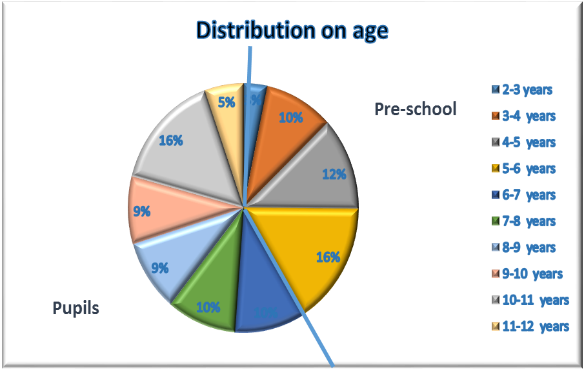
We note that the samples are relatively equivalent in rural and urban areas in terms of distribution by age group:
- rural area: 59 preschool children and 103 school age;
- urban environment: 76 preschool children and 92 school age;
There are 80 boys and 79 girls from the urban regions and 82 boys and 89 girls from rural areas. In urban areas, we have more unique children (45%) than in the rural ones (30%), where there are a large number of families with many children (20% have at least 3 children).
Findings
We demanded information on the families’ having learning sources in the house (as TV’s, PC’s, library). The results are presented in figure 2.
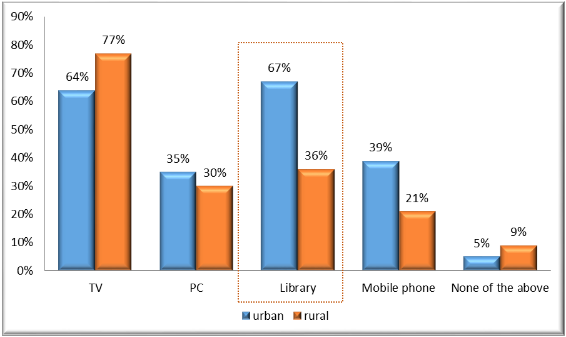
The study shows that most children have TV in the room, but only 36% of rural children have a library. If children in rural areas without a library add the 15 children who do not have any of the above, the percentage exceeds 70%. The computer is present in the room of one third of the children surveyed, regardless of the place of origin.
The results are pre-pandemic. A recent study of the Romanian Institute for Evaluation and Strategy (IRES): The school in state of emergency. Romanian children's access to online education (2020) shows that: 32% of children, (about 900,000 of students enrolled in education) pre-university students in Romania do not have individual access to a functional device (e.g. laptop, tablet, desktop) for online school;
To question 8: For the period when attending kindergarten/ school (excluding holidays) appreciate, on average, how long your day is available for your child for recreation? (a –under 2 hrs, b – 2-3 hrs, c- 3-4 hrs, d -4-5 hrs, e-5-6 hrs, f – over 6 hrs, g –no response), the percentages are represented in table 1.
The results show that only 20% of the children living in urban areas feel they have a lot of free time (over 5 hours) and the percentage is almost double (36%) in rural areas. Children from the cities spend more time at school through "after school" programs, practicing a sport, pupils' clubs, extracurricular activities (correlated with item 12). Obviously, the distribution is different in age groups, as pre-schoolers have more free time than pupils.
Their favourite leisure activities are in order: (see table 2).
Regarding the average time spent on each of the favourite activities, the study showed that urban children spend an average of 2 hours playing with other children, less than 1 hour reading. In average, these children spent 3 hours on Internet connected devices (PC, smartphones). Time spent on household chores is reduced to about 15 minutes a day.
Rural children play with the others for about 3 hours, but spend more time helping their parents (2 hours a day). Watching TV is in averaged for 2 hours, reading 30 minutes a day.
The correlation analysis has shown an interesting fact: children with higher education graduated parents read more than those with parents that graduated medium or elementary education.
Question 10 was: About how much time do you spend daily with your child (listening to him, talking to him, reading to him). The results are presented in figure 3.
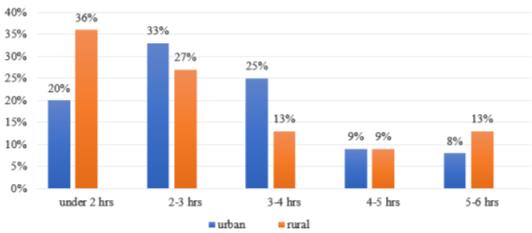
The percentage of parents who spend little time (less than 3 hours) with activities with their child is higher in rural areas (63%) than in urban areas (53%).
The next question for parents was: In a usual day (except weekends and holidays) how much time do you spend reading to your child? Results show that almost half of them never read to their children, and the other half read about 30 minutes per day. This limited time is appropriate for small children, considering that their attention cannot be focused for more than 30 minutes (see figure 4).
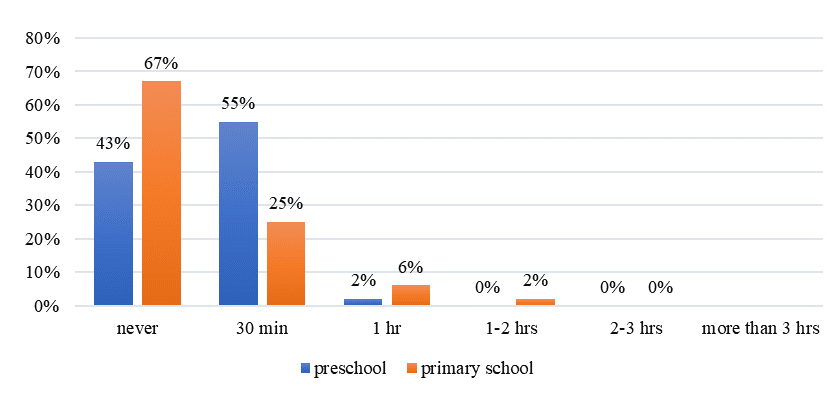
The primary school children read for themselves and only at the beginning grades parents are involved. The study shows that only 30% of them are reading. Reading is a very crucial milestone in the academic journey of an elementary school child, as evidence suggests that attitudes of both boys and girls toward reading become more negative as they get older (Sainsbury & Schagen, 2004).
We wanted to find out which are the favourite books for these children. The study showed that, among reading children, there is a big interest for fiction books (see figure 5).
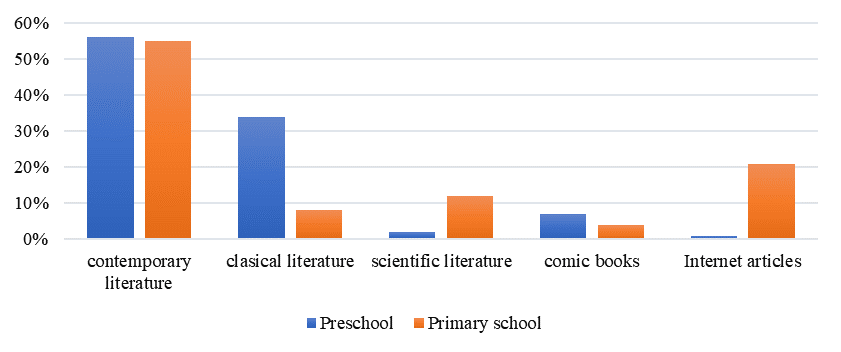
There’s also an evident interest for contemporary literature. The classical one is still referred by 30% of the parents, as they are reading to their children stories they learned during their own childhood. School aged children reject classical literature, as being hard to read and not updated to their real life and nowadays interests. Comic books represent interest more for preschool children than pupils, while the Internet articles are interesting for up to 20% of the primary school children.
Partnership is a form of cooperation and collaboration, in support of the child, in order to achieve the desiderata of the educational process. It involves school-family collaboration in achieving educational goals, by making joint actions in or outside the school environment. The advantages of this form of collaboration are multiple, is related to all the actors involved, the first beneficiaries being the children. It is about:
a unity of the school and family requirements, which will converge towards positive results;
creating a collaborative climate and providing mutual support to the partners involved;
a better family-school-community communication.
The last question inquired the parents about efficient means of school-family cooperation to increase children’s interest and motivation to reading. The answers offered multiple ideas about the ways in which the two factors can collaborate:
lectures organized by the school, aiming at counselling and educating parents (could address topics such as the importance of reading in the holistic development at an early age, types and reading suggestions adapted to the age of children, active reading techniques);
counselling parents to provide them with psycho-pedagogical support and intervention in supporting their effort to familiarize children with the world of books;
organizing extracurricular activities, indoor and outdoor, to popularize reading for pleasure (reading sessions in nature, library and bookstores visits, role-playing games and dramatizations, etc.)
activities aiming to acquire books for children (as sponsorships, fairs, donations).
Conclusion
Adopting reading as a constant habit by children is an excellent way to stimulate the imagination, to develop their vocabulary, the ability to understand, learn and analogy, to train their attention and memory.
Unfortunately, in today's technological avalanche, many children discover the computer or tablet screen before stepping into the wonderful world of books.
The conclusions of our research are:
- there is a big gap between children in rural and urban areas. The rural environment, with no access to books and libraries and limited parent implication, is determining a low rate of children’ reading for pleasure, except school assessments;
- many children (up to 70%) have Internet connected devices, but only 36% of the ones living in rural areas have a library in the house;
- the low socio-economic environment determine less interest in acquiring books and learning devices;
- children having parents that read for pleasure will enjoy reading as well. This idea is also stated in important studies, that showed that „a significant contributor to children’s motivation to read and reading achievement is their parents’ attitudes and behaviors toward readingˮ (Merga, 2014, pp. 149–163);
- Internet browsing, social networking and video games are among today’s children leisure activities. Children living in urban areas spend daily 3 hours on the Internet and only about 30 minutes for reading books. The ones living in rural areas spend less time on the Internet, as they play with the others for about 3 hours daily and also spend more time helping their parents;
- nowadays children prefer contemporary literature, comic books and Internet articles. We can observe an increased interest for Internet articles as the children grow (last two years of primary school);
- parents demand school and teachers’ help in selecting the proper books for their children, increasing their children motivation and interest in reading.
At early ages, parents have a big impact in making their children interested in books and reading. Through a process called modelling, they can influence the children’s personal enjoyment of reading. Nancy Newman (2018, pp. 150-169) proposes five important steps that parents need to attend to bring the child closer to the book:
1. talking to the child as much as possible, regardless of his age (verbalization of each action, description of the surrounding elements, association of sounds with letters, identification of different sounds, etc.)
2. encouraging the child's play and free time (transforming any space into an element that generates playful behaviour)
3. reading texts in various ways (identifying contexts and various ways of reading)
4. motivating the young reader; (association of reading with emotional comfort)
5. balanced use of technology (involvement of new technologies in the act of reading - digital stories
If the school and families join their forces in stimulating children’s interest in reading, the children would benefit of early literacy development. Children that read for pleasure during their free time have better school results. They acquire better results both on vocabulary and spelling tests, as well as mathematics, proving that reading impacts on the analysis, generalization and information processing capacities. When pupils at the basic level of education are proficient in reading, it makes learning an enjoyable activity, which fosters the drive to acquire more knowledge, and leads to the production of a holistically developed human resource.
Developing the child's interest in reading is a long-term endeavour. Initiated by parents, later supported by teachers, it requires constant, multiple and varied interventions associated with each role that this laborious process plays.
References
Andrei, A. M., Botnariuc, P., Călineci, M. C., Gavriliţă, A., Goia, D., Tăsica, L., & Tibu, S. (2014). Parteneriatul Şcoală-Familie-Comunitate [School-Family-Comunity Partnership], Retrieved on the 29th of July, 2021 from https://www.ise.ro/wp-content/uploads/2015/03/Parteneriat_scoala-familie_ISE.pdf
European Council. (2018). Council Recommendation of 22 May 2018 on key competences for lifelong learning, in Official Journal of the European Union., 61. Retrieved on the 4th of June, 2021, from https://eur-lex.europa.eu/legal-content/EN/TXT/PDF/?uri=OJ:C:2018:189:FULL&from=EL
Merga, M. K. (2014). Exploring the role of parents in supporting recreational book reading beyond primary school. English in Education, pp. 149–163, in the Research Journal of the National Association for the Teaching of English, 48(2). https://doi. org/10.1111/eie.12043
Newman, N. (2018). Cum să creștem cititori pasionați [How to raise passionate readers]. Gama.
Romanian Institute for Evaluation and Strategy (IRES) (2020). Școala în stare de urgență. Accesul copiilor școlari din România la educație online [The school in state of emergency. Romanian children's access to online education], Retrieved on the 29th of July, 2021 from https://ires.ro/uploads/articole/ires_accesul-elevilor-scolari-la-educatie-online_policy-paper_mai-2020.pdf
Sainsbury, M. & Schagen, I. (2004). Attitudes to reading at ages nine and eleven, in Journal of Research in Reading, 27(4),375-386. DOI: 10.1111/j.1467-9817.2004.00240.x
Copyright information

This work is licensed under a Creative Commons Attribution-NonCommercial-NoDerivatives 4.0 International License.
About this article
Publication Date
23 March 2022
Article Doi
eBook ISBN
978-1-80296-955-9
Publisher
European Publisher
Volume
2
Print ISBN (optional)
-
Edition Number
1st Edition
Pages
1-803
Subjects
Education, Early Childhood Education, Digital Education, Development, Covid-19
Cite this article as:
Boja, A., & Achim, F. (2022). The Role Of School-Family Partnership In Developing Children’s Interest For Reading. In I. Albulescu, & C. Stan (Eds.), Education, Reflection, Development - ERD 2021, vol 2. European Proceedings of Educational Sciences (pp. 453-461). European Publisher. https://doi.org/10.15405/epes.22032.45

